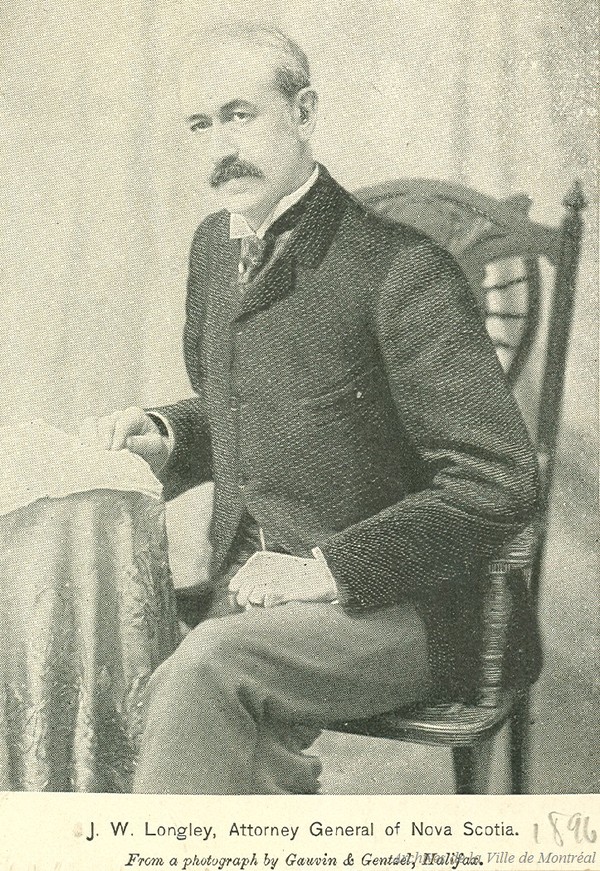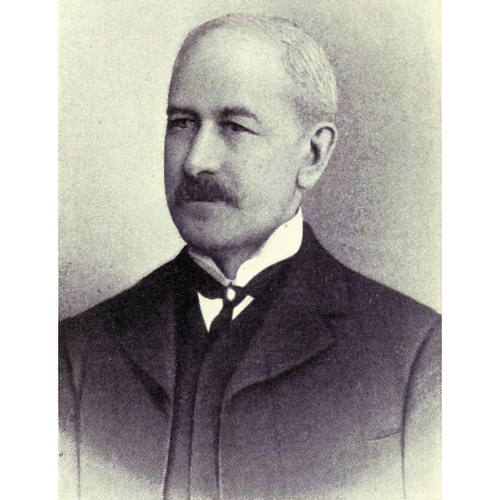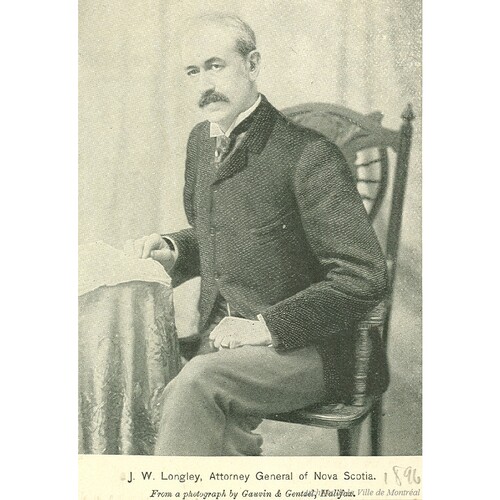
Source: Link
LONGLEY, JAMES WILBERFORCE, journalist, lawyer, politician, judge, and author; b. 4 Jan. 1849 in Paradise, N.S., youngest and only surviving child of Israel Longley and Frances Manning; grandson of Edward Manning*; m. first 3 Sept. 1877 Annie Brown (Browne) (d. 1899) in Middleton, N.S., and they had two sons and two daughters; m. secondly 4 April 1901 Lois Elizabeth Fletcher (d. 1958) in Binkley, Kent, England, and they had three sons; d. 16 March 1922 in Halifax.
J. W. Longley’s New England Planter ancestor settled in Nova Scotia’s Annapolis County about 1760. Raised on a farm, Longley was educated at the grammar school in Paradise and at Horton Academy in Wolfville. In 1867 he matriculated at Acadia College, where he graduated ba in 1871 (ma 1877, dcl 1897). In the autumn of 1871 he moved to Halifax and began the study of law with Hiram Blanchard*. Called to the bar in 1875, Longley was already working as a journalist, having two years earlier become chief editorial writer for Halifax’s independent liberal organ, the Acadian Recorder [see Henry Dugwell Blackadar*]. In 1887 he would be made managing editor of the Halifax Morning Chronicle, Nova Scotia’s chief Liberal newspaper. From 1875 to 1882 he practised law in Halifax, but as Benjamin Russell*, a fellow barrister and judge, would candidly observe, Longley’s heart “was not in the profession.” Politics was his forte and obsessive love; law was but the stepping stone to preferment.
From childhood Longley was inured to partisan politics, attending his first political meeting at age ten. His father stood unsuccessfully for the provincial Liberals, and his uncle Avard Longley* was a Conservative mha and later an mp. Longley himself gave his first political speech, on the anti-confederate Liberal platform, in 1867. In 1882 he was first elected to represent Annapolis County in the House of Assembly, and he would continue to do so for the next 23 years, apart from a brief hiatus in 1896. He served William Stevens Fielding as minister without portfolio in 1884–86 and from 1886 as attorney general, a post he was to hold until his appointment to the Supreme Court of Nova Scotia on 13 June 1905. Longley’s only foray into dominion politics occurred in June 1896, when he resigned his seat at Annapolis to contest the riding federally. He came within 200 votes of defeating the incumbent Conservative, an outcome that mirrored the close results in Nova Scotia, where the Liberals and Conservatives each took ten seats. But for this setback, he might have become premier. When in April Fielding had floated with his caucus the idea of entering federal politics, Longley had had the most support as his successor. As it was, Fielding was able to use Longley’s defeat to ensure that his own preferred heir, George Henry Murray, became party leader in July. Murray retained Longley as attorney general and also made him commissioner of crown lands, a post which some felt demeaned the senior law officer of the crown.
Given his long tenure as attorney general, Longley’s record was not particularly noteworthy. A high point for him was his appearance in England before the Judicial Committee of the Privy Council in 1895, when he argued that the decisions of the Nova Scotia courts should be overturned in a matter concerning the power of the House of Assembly to imprison for contempt. The JCPC agreed that a provincial statute authorizing this power was valid and that it had been properly invoked in the instant case. One of Longley’s first pieces of legislation had empowered the attorney general, rather than judges of the Supreme Court, to appoint lawyers to carry on criminal prosecutions in the counties. An act of 1888 provided a standard process for the incorporation of towns. A number of reforms arose in response to Nova Scotia’s industrial revolution of the 1880s and 1890s. A major revision of company law was undertaken in 1900, at the same time that the employer’s common-law defence of contributory negligence was abolished in suits by employees for workplace accidents. The province’s first factories act was passed in 1901, regulating the employment of women and children and requiring some safety measures, but it was a rather tentative effort. One of the most notable legacies of the Longley era was the plethora of new legislation dealing with children, which also included laws providing for the reform of juvenile offenders, forbidding the provision of tobacco and opium to children, regulating their hours of work, instituting equal custody rights for parents, licensing nursing homes for infants, and permitting adoption.
During these years Longley suffered the death of his own favourite child, Frances Mary, aged 13, in June 1898. It was followed by that of Mrs Longley in October 1899. These losses profoundly saddened but did not demoralize him. Eighteen months after his wife’s death he remarried in England, his second wife being some 23 years his junior. He would have three more children.
Longley had vacillated for some time on the question of repeal of confederation, which had been championed by Fielding in the provincial election of 1886, before finally rejecting the idea. More a pan-Americanist than a Canadian nationalist, he favoured unrestricted reciprocity extending across both North and South America, a position that made him possibly the earliest Canadian exponent of a hemispheric free-trade agreement. The solution to the economic disequilibrium induced by confederation was regionalism, and that meant Maritime union, of which Longley was among the first advocates. The solution to Britain’s sacrifice of Canadian interests was for Canada to cut the imperial knot and enter into a continental partnership with the United States. George Monro Grant* suspected that Longley was an annexationist, an opinion with which Benjamin Russell, who had also become active in Liberal politics and was certainly in a position to know, agreed. Longley travelled regularly in the United States and knew many of the business and political leaders of the eastern region, including Erastus Wiman*, the Canadian-born New Yorker who led the movement for commercial union between the two countries. Rare enough among Canadian public figures of the day, Longley admired American political institutions, believing that “in the main, the United States have worked out the problem of popular government with most wonderful results.” A radical Liberal, Longley favoured abolition of the Senate and tried unsuccessfully to rid Nova Scotia of its upper house.
Yet ideologically Longley was a bundle of contradictions. Historian Colin D. Howell describes him as “an unreconstructed opponent of powerful labour unions and female emancipation.” There was no progress on either of these fronts during the nearly 20 years that Longley served as attorney general. So agitated was he by women’s suffrage that in 1918, when the enfranchisement bill was finally about to pass, Longley, 13 years out of politics, went to the gallery of the House of Assembly to loom over the proceedings. In spite of his professed admiration for American-style popular government, he had constantly opposed attempts to widen the provincial franchise, stating in 1885 that a property qualification was necessary “until a degree of intelligence is reached that has not been reached yet in this country.”
Longley was a difficult, egotistical individual whose unattractive personality prevented his rising higher in politics. A member of his own party described him as “conceited, unlovable and unbearable.” Family tradition has preserved an incident particularly revealing of Longley’s hauteur. Attending a dinner at which Mark Twain was also present, Longley rose and left the room when Twain rather than he himself was called on to speak first. Had the Liberals not been in power in Ottawa and had Fielding not been a powerful minister in Sir Wilfrid Laurier*’s cabinet, Longley would never have secured a position on the Supreme Court of Nova Scotia in 1905 in succession to Robert Linton Weatherbe*, who had been made chief justice. Seven-eighths of the bar, Fielding was told, opposed the appointment. Longley’s 17 years on the bench were unremarkable, though he earned some respect when one of his early decisions, involving a dispute over the quality of coal delivered by the Dominion Coal Company to the Dominion Iron and Steel Company, was upheld by the JCPC. In 1915 he presided over the first trial of Harry Allen for the murder of black lawyer James Robinson Johnston*, which was set aside as a result of errors in his charge to the jury. While on the bench Longley occasionally chaired conciliation panels in industrial disputes under William Lyon Mackenzie King*’s federal legislation of 1907.
Longley was a frequent public speaker and prolific writer, especially on historical and political subjects. Elected a fellow of the Royal Society of Canada in 1898, a rare honour for an active politician, he became its vice-president in 1916 and honorary president in 1917. President of the Nova Scotia Historical Society from 1897 to 1905, he played a major role in the 1899 sesquicentenary of the founding of Halifax, which was grandly celebrated, and in the tercentenary of Annapolis Royal in 1904. Longley was elected a corresponding member of the Massachusetts Historical Society in 1908. He was also president of the Nova Scotia Exhibition Commission, 1896–1910, and of the Charitable Irish Society of Halifax, 1909–12. An Irish descendant on his mother’s side, he was a warm supporter of Home Rule; he lived long enough to see Ireland engulfed in civil war. Longley was the author of the first important book-length study of Joseph Howe* and of a biography of Sir Charles Tupper*, but his historical scholarship has not stood the test of time. He took for his model the American historian Charles Francis Adams, after whom he named the youngest son of his second marriage.
An oil portrait of J. W. Longley by Alfred T. Barrett hangs in the Law Courts Building in Halifax.
[J. W. Longley was the compiler of The trial of Peter Mailman for the murder of his wife at Lunenburg, N.S. . . . (Halifax, 1874) and the author of Love (Toronto, 1898), Joseph Howe (Toronto, 1904) and Sir Charles Tupper (Toronto, 1916). A list of his extensive periodical writings may be found in H. G. Morse, “Acadia authors: a bibliography,” Acadia Bull. (Wolfville, N.S.), 11 (1922), no.11. The chief source of information about Longley’s early life and political career is his memoirs, “Reminiscences political and otherwise,” published as a five-part series in Canadian Magazine, 55 (May–October 1920): 443–50; 56 (November 1920–April 1921): 60–67; 147–53; 210–16; 309–13. His personal papers, which would have contained the manuscript of an unpublished novel as well as of his incomplete multi-volume political history of Canada, were unintentionally destroyed after his widow’s death in 1958. b.c. and p.g.].
AO, F 2. Halifax County Court of Probate (Halifax), Estate papers, no.10164. LAC, MG 26, G (mfm. at NSARM). NSARM, MG 2, 422–541, 784–90(B). Morning Chronicle (Halifax), 17 March 1922. J. M. Beck, Politics of Nova Scotia (2v., Tantallon, N.S., 1985–88). Biographical review . . . of leading citizens of the province of Nova Scotia, ed. Harry Piers (Boston, 1900). Canadian annual rev., 1901–10. Canadian men and women of the time (Morgan; 1898 and 1912). Dominion annual reg., 1884–86. John Doull, Sketches of attorney generals of Nova Scotia, 1750–1926 (Halifax, 1964). Philip Girard, “The Supreme Court of Nova Scotia, responsible government, and the quest for legitimacy, 1850–1920,” Dalhousie Law Journal (Halifax), 17 (1994): 429–57. D. C. Harvey, “Fielding’s call to Ottawa,” Dalhousie Rev. (Halifax), 28 (1948–49), no.4: 369–85. C. D. Howell, “Repeal, reciprocity, and commercial union in Nova Scotian politics, 1886–1887” (ma thesis, Dalhousie Univ., Halifax, 1967). K. M. McLaughlin, “The Canadian general election of 1896 in Nova Scotia” (ma thesis, Dalhousie Univ., 1967); “Race, religion and politics: the election of 1896 in Canada” (phd thesis, Univ. of Toronto, 1974); “W. S. Fielding and the Liberal party in Nova Scotia, 1891–1896,” Acadiensis (Fredericton), 3 (1973–74), no.2: 65–79. RSC, Trans., 1898–1922.
Cite This Article
Barry Cahill and Philip Girard, “LONGLEY, JAMES WILBERFORCE,” in Dictionary of Canadian Biography, vol. 15, University of Toronto/Université Laval, 2003–, accessed April 29, 2025, https://www.biographi.ca/en/bio/longley_james_wilberforce_15E.html.
The citation above shows the format for footnotes and endnotes according to the Chicago manual of style (16th edition). Information to be used in other citation formats:
| Permalink: | https://www.biographi.ca/en/bio/longley_james_wilberforce_15E.html |
| Author of Article: | Barry Cahill and Philip Girard |
| Title of Article: | LONGLEY, JAMES WILBERFORCE |
| Publication Name: | Dictionary of Canadian Biography, vol. 15 |
| Publisher: | University of Toronto/Université Laval |
| Year of revision: | 2005 |
| Access Date: | April 29, 2025 |




